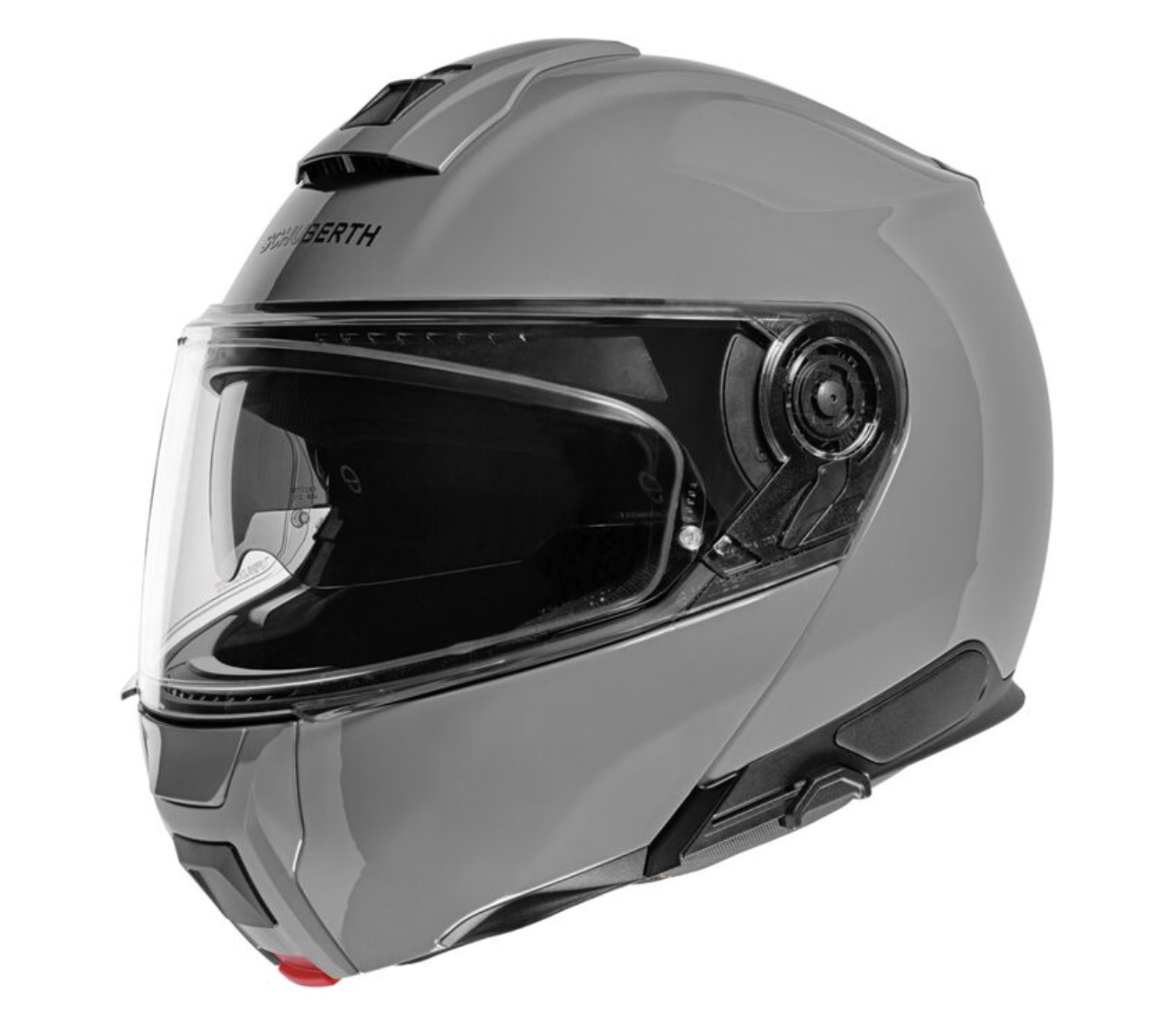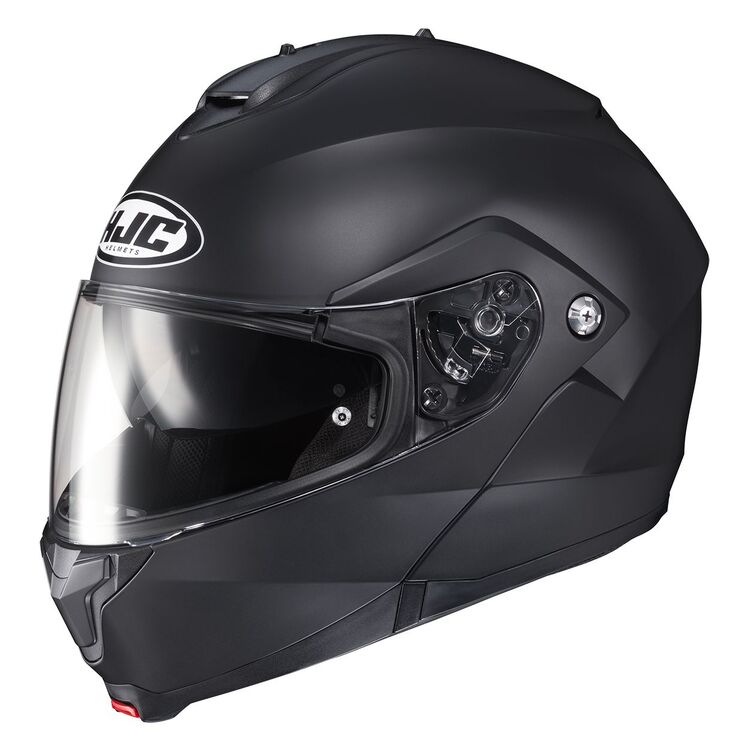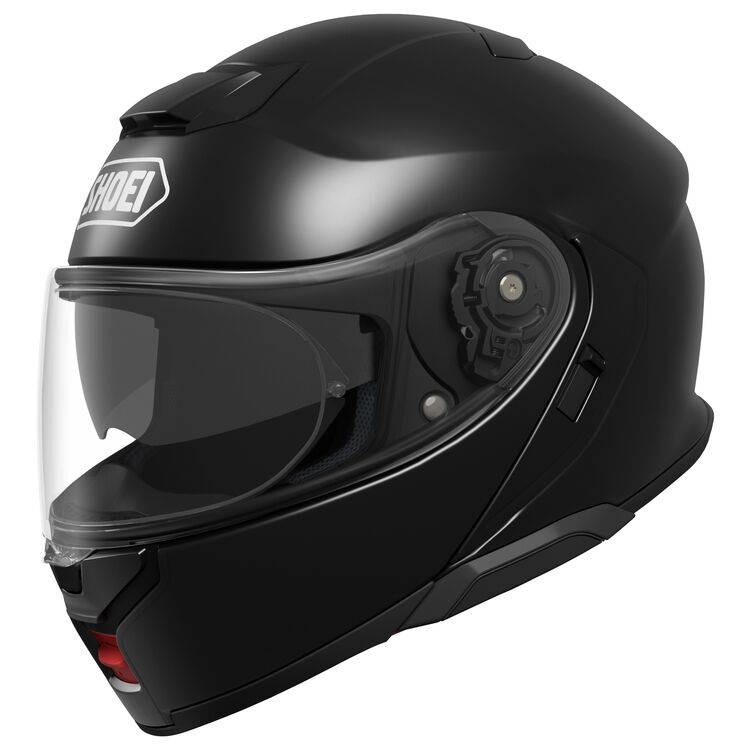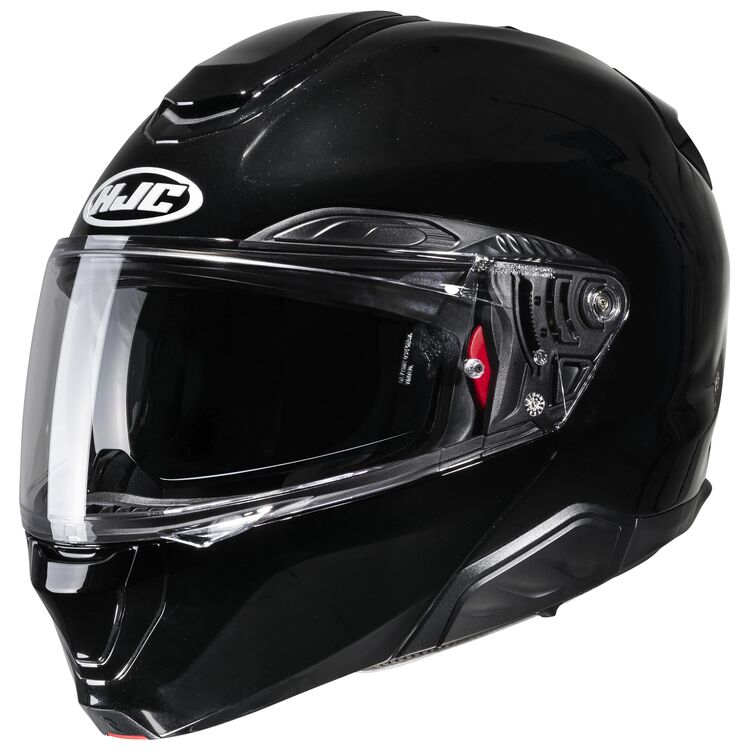
Schuberth C5 vs HJC C91: Touring and Commuting Compared
left for contents
Modular helmets are the go‑to choice for riders who split their time between highway touring and daily commuting. They offer the freedom to flip up the chin bar at gas stops or in traffic, yet promise full‑face protection when speeds climb.
Two of the most talked‑about flip‑ups today are Schuberth’s premium C5 and HJC’s budget‑friendly C91.
Below we compare them head‑to‑head to help you decide whether the extra ~$590 for the C5 is justified.
Quick Take: Which Helmet Fits Your Ride?
Buy the Schuberth C5 if…
- You prioritise the quietest ride possible. The C5’s fiberglass/carbon shell and refined aerodynamics make it quieter at highway speeds than most modulars.
- You want state‑of‑the‑art safety. It’s the first modular helmet to meet the tougher ECE 22.06 standard and carries dual P/J (open/closed) homologation for legal riding with the chin bar raised.
- Integrated communication and premium finish matter. The C5 has pre‑installed speakers and antennas for Sena‑based SC2 comms and boasts a five‑year warranty.
The quietest touring helmet money can buy, kitted out with all the features you expect for those long days in the saddle.
- Modular flip up chin bar
- Drop down sun visor
- Space for integrated comms unit
- Many colorway options
- DOT certified, with ECE in EU
Buy the HJC C91 if…
- You’re shopping on a tight budget. At around $170–$190, it offers respectable protection and convenience.
- You have a round‑oval or intermediate‑oval head and need an easy‑fit flip‑up for occasional tours or commuting.
- You want a simple modular with good ventilation, integrated sun visor and Smart HJC readiness, but aren’t concerned about top‑tier quietness or the latest safety standard.
An affordable, lightweight modular helmet that delivers comfort, solid fit, and handy features like drop‑down sun visor and SmartHJC Bluetooth integration.
- Lightweight and comfortable modular convenience
- Great airflow and ventilation even on long rides
- Secure, easy-to-use flip-up chin bar mechanism
- SmartHJC-ready – seamless Bluetooth add-on capability
- Runs small; most riders need to order one size up
- Wind noise at highway speeds may require earplugs
The Schuberth C5 commands roughly $590 more than the HJC C91, but you get quieter performance, a lighter and safer shell, dual homologation and integrated comms readiness. If noise isolation, safety certification and long‑distance comfort are your top priorities, the premium is worth it. Budget‑conscious riders or occasional commuters may find the C91 adequate.
Spec Showdown: Crunching the Helmet Stats
| Specs | Schuberth C5 | HJC C91 |
|---|---|---|
| Weight | ~1,640–1,660 g (3.6 lb) depending on size | 1,706 g / 3 lb 12 oz (XL) |
| Fit/Shape | Intermediate‑oval with 2 shell sizes; secure but plush interior; runs true to size | Round‑oval/Intermediate‑oval; runs small—size up; cheek pads tight until broken in |
| Shell/Materials | Direct Fibre Processing (DFP) glass‑fibre shell reinforced with carbon for strength and weight reduction | Advanced polycarbonate composite shell using CAD for light weight and comfort |
| Safety/Certifications | ECE 22.06 & DOT (dual P/J homologated for open/closed use) | DOT & ECE 22.05 (no P/J certification) |
| Ventilation/Weatherproofing | Large top vent plus dual chin inlets with washable filters; multi‑channel EPS for high airflow; includes Pinlock insert | Large top vent and advanced channeling ventilation; integrated chin vent; air flows through deep EPS channels; no filters; Pinlock‑ready shield |
| Electronics/Battery | SC2 communication system ready (pre‑installed speakers/antennas); Sena 50‑Series based; optional 8 h mesh / 12 h Bluetooth talk time | Smart HJC 10B/20B ready; Bluetooth units sold separately |
| Warranty | 5‑year manufacturer warranty | 3‑year warranty |
| Street Price (Aug 2025) | $769–$869 (solid colours to graphics) | $169–$190 (solid colours) |
Which Rider Are You? Pick Your Match
Choose the Schuberth C5 if you:
- Ride long distances or value quietness. Its carbon‑reinforced shell and wind‑tunnel‑tested shape noticeably reduce wind roar and buffeting, making earplugs optional for most riders.
- Want the latest safety tech. The C5 meets ECE 22.06, offering more rigorous impact and rotational testing than the C91’s 22.05 rating.
- Commute in varied weather. Washable vent filters keep dust out, and the included Pinlock insert prevents fogging, making it adaptable to humid or rainy climates.
- Use communications often. Built‑in speakers and antennas make upgrading to the SC2 (Sena) system plug‑and‑play; talk time up to eight hours in mesh mode.
- Appreciate refined finishing touches. Premium liners, micro‑ratchet chin strap, tight visor seals and a five‑year warranty justify the higher price.

Choose the HJC C91 if you:
- Have a limited budget. Its street price of $170–$190 delivers modular convenience without breaking the bank.
- Need a round‑oval fit. The C91 suits round‑oval heads and offers glasses grooves; just remember to size up if between sizes.
- Ride mainly in the city. Ventilation is adequate, and noise isn’t problematic at urban speeds; earplugs are still recommended for highways.
- Prefer simple, proven features. The single‑lever chin bar is glove‑friendly, the sun visor operates smoothly, and the interior is moisture‑wicking.
- Plan occasional tours but not extended high‑speed travel. It’s heavier and louder than premium options, but still provides DOT and ECE protection and Smart HJC readiness.
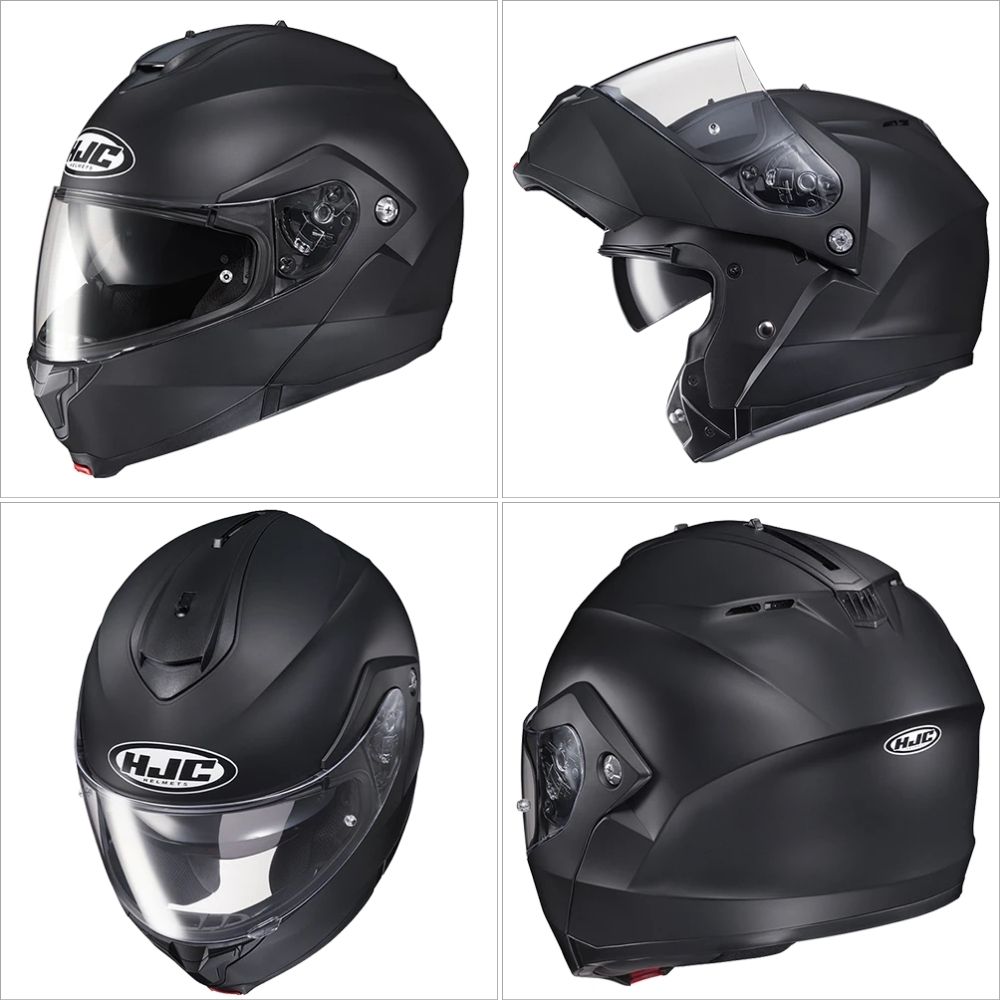
Voices from the Road: What Riders Really Say
Schuberth C5
- Owners praise the excellent ventilation from the large top vent and dual chin inlets.
- A long-term review on our site notes that opening the top vent “lets cool air rush down on your head” and the lower vent clears the visor quickly.
- Riders report the C5 is quieter than expected, with less buffeting than the Shoei Neotec 2.
- Comfort is high thanks to plush liners and an easy-to-reach chin-bar button.
- The main criticism is weight; at over 1.6 kg the helmet can be tiring during very long days.
- Some early units had a visor drop issue, but the fix is simple and Schuberth has already addressed it.
- Overall satisfaction is high among touring riders.

Long-term owners have also flagged—and solved—a visor drop issue. We tested the fix ourselves in our Schuberth C5 five-month review & visor fix.
HJC C91
- Riders appreciate that the C91 fits comfortably once broken in, especially for round-oval heads.
- The glasses groove and SuperCool interior make it easy to wear all day.
- The flip-up mechanism and Smart HJC compatibility earn praise for convenience.
- Many note that the helmet runs small, and the cheek pads stay tight for weeks or need thinner replacements.
- Fogging is an issue without a Pinlock insert.
- The integrated sun visor can cause optical distortion.
- Noise is average at best—acceptable in the city, but highway speeds bring notable wind roar (earplugs and aftermarket chin curtains recommended).
- Overall, the C91 is considered good value, but not a premium experience.
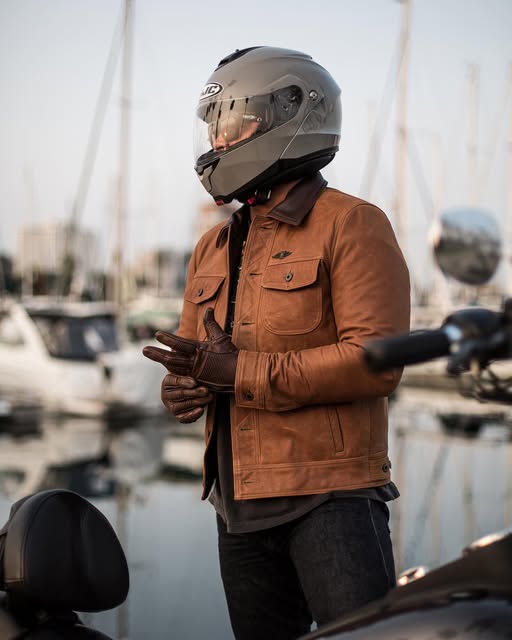
Helmet Face-Off: Breaking It Down by What Counts
Noise at Highway Speeds
Schuberth invests heavily in aerodynamics and acoustic engineering. The C5’s carbon‑reinforced shell and compact profile were refined in a wind tunnel to minimize turbulence. Combined with a thicker neck roll and effective seals, riders consistently report a quieter ride than most modulars. Noise levels remain tolerable at highway speeds, particularly behind a windshield.
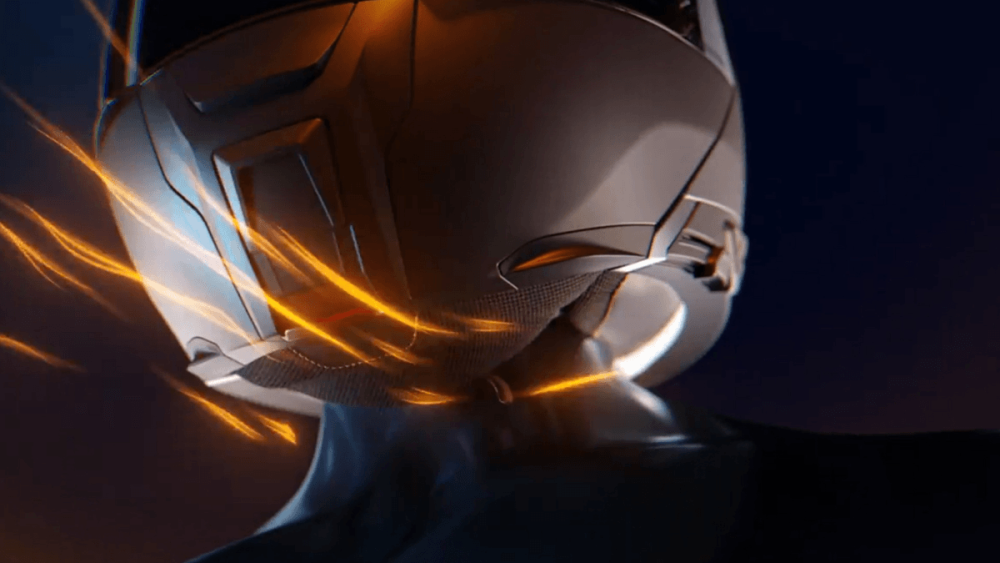
In contrast, the C91’s polycarbonate shell transmits more vibration and lacks the neck curtain found on premium lids. Reviews describe average to loud noise levels for a modular; wind roar becomes pronounced above ~50 mph, and hearing Bluetooth speakers can be difficult without earplugs.
For riders who value quietness, the C5 is markedly better.
Weight & Fatigue
The C5 uses a glass‑fibre shell reinforced with carbon, allowing Schuberth to hit around 1.64–1.66 kg while still meeting the more stringent ECE 22.06 standard. This isn’t ultra‑light but it’s reasonable for a modular, and the well‑balanced weight distribution reduces neck strain.
The C91’s polycarbonate shell requires more material to achieve similar strength; it weighs around 1.7 kg (3 lb 12 oz). Combined with its larger dimensions (to fit broad head shapes), some riders experience fatigue on longer rides.
If weight is your top concern, neither helmet is feather‑light, but the Schuberth is slightly lighter and better balanced.
Ventilation & Heat Management
Ventilation is an area where both helmets perform well but differ in refinement. The C5 features a large top vent and dual chin vents with removable filters to keep bugs and dust out. Air flows through multiple channels in the EPS foam and exits via rear exhaust ports. Owners praise the phenomenal venting and note that the top vent delivers a strong rush of air when open.
The C91 uses HJC’s Advanced Channeling Ventilation System, with a big top vent, chin vent and internal channels. Airflow is adequate for moderate climates but can feel limited on hot, humid days, partly because the helmet sits snugly and there are no replaceable filters.
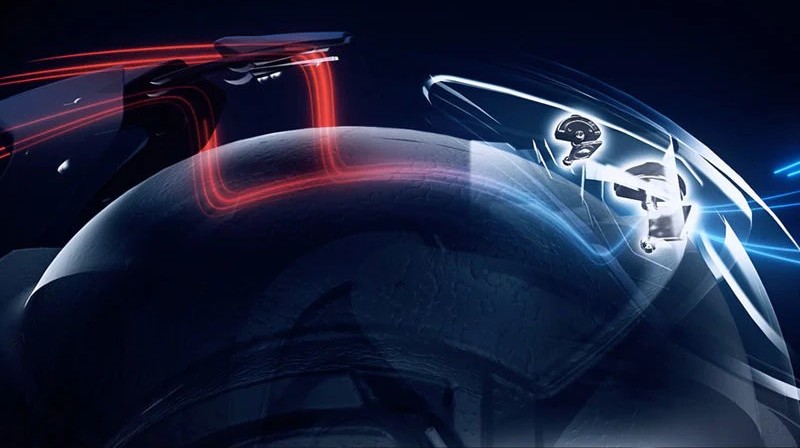
Both visors are Pinlock‑ready, but only the C5 includes the insert.
Visor & Sun Shield Usability
Both helmets offer a clear main visor and a drop‑down sun visor.
The C5’s visor is optically excellent and includes a Pinlock 120 anti‑fog insert; it seals securely and can be removed without tools. The sun shield deploys via a left‑mounted slider and offers good coverage.
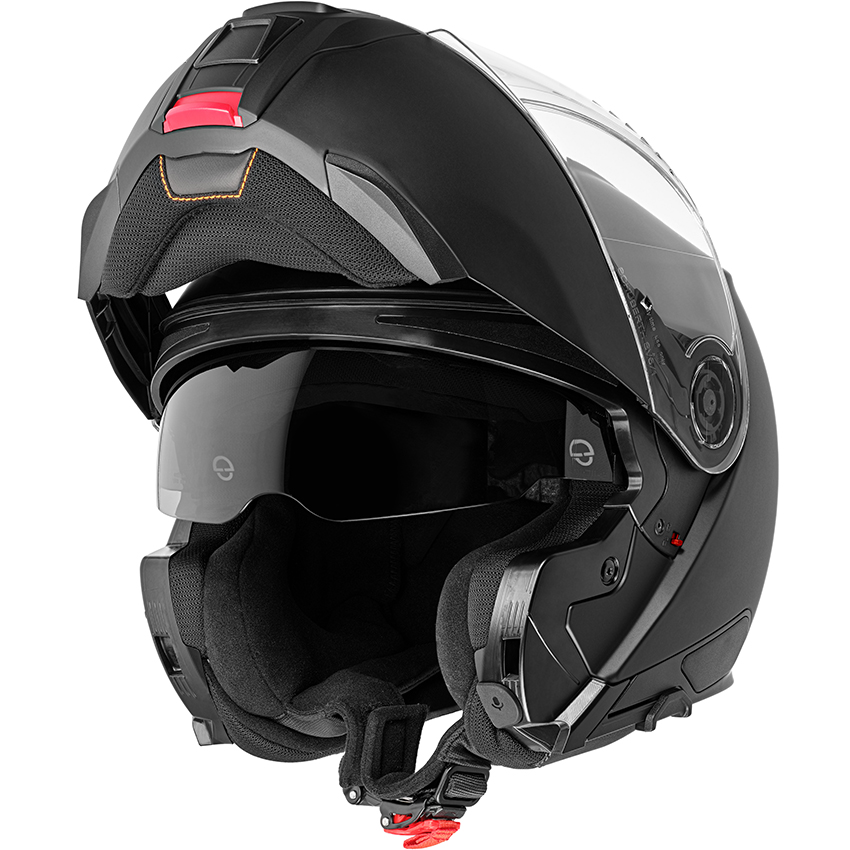
HJC’s C91 visor is Pinlock‑ready (no insert included) and uses the HJ‑17 shield; the RapidFire system allows quick swaps. However, riders report the sun visor’s optics are not as clear and can distort vision. Fogging is a recurring complaint until riders install a Pinlock.
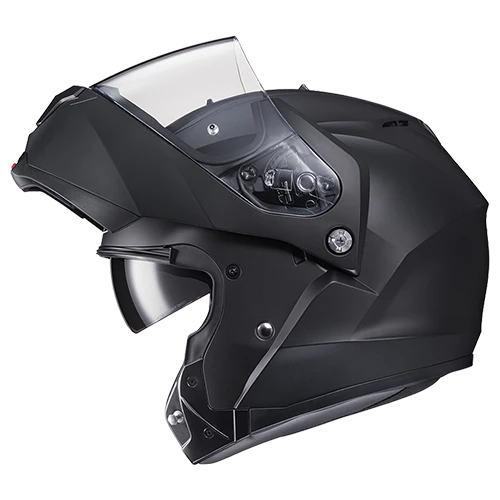
The chin bars on both helmets open via a single central button and have positive detents to hold the bar up; only the C5 carries dual P/J homologation to legally ride open.
Communication Readiness & Electronics
Schuberth integrates speakers and antennas into the C5 shell so that adding the SC2 (based on Sena 50‑Series) involves snapping in a control unit and battery. This system offers mesh intercom up to ~8 hours and Bluetooth talk time around 12 hours. Because of its hidden installation, it doesn’t compromise aerodynamics.
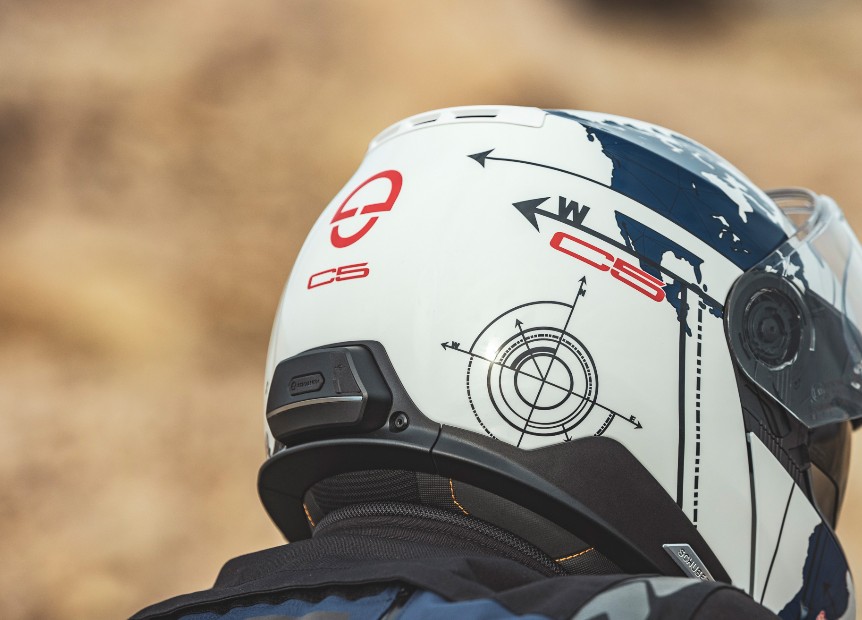
HJC’s C91 is Smart HJC ready, meaning it accepts 10B/20B units developed with Sena. These units attach externally; installation is straightforward but not as seamless. Battery life and audio quality depend on the chosen unit but generally don’t match the SC2’s mesh network capabilities.
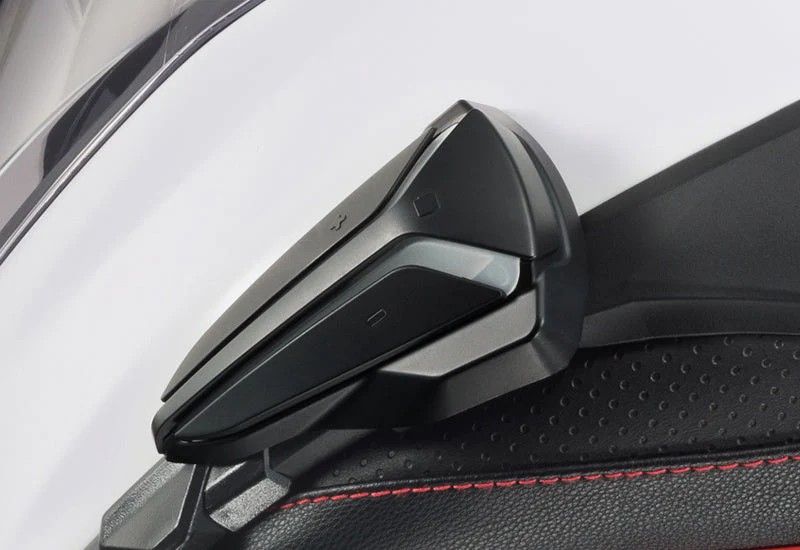
Build Quality & Finish
The C5 commands a premium price partly due to its fit and finish. The liner materials feel plush, the paintwork is deep, and the micro‑ratchet strap is easy to operate even with gloves. Small touches like washable vent filters and a five‑year warranty show attention to detail.
The C91’s build quality is solid for its price; the SuperCool interior is soft and easy to remove, and the shell paint is durable.

However, owners note minor issues such as loose plastic trim, visor seals that allow water intrusion, and the general feeling that it’s more utilitarian than refined. You get what you pay for.
Breaking Down the Price Tag: Feature-Per-Dollar Math
At roughly $770–$870, the Schuberth C5 is one of the most expensive modular helmets on the market. The HJC C91, at $170–$190, costs about a quarter of that. What do you gain by spending the extra money?
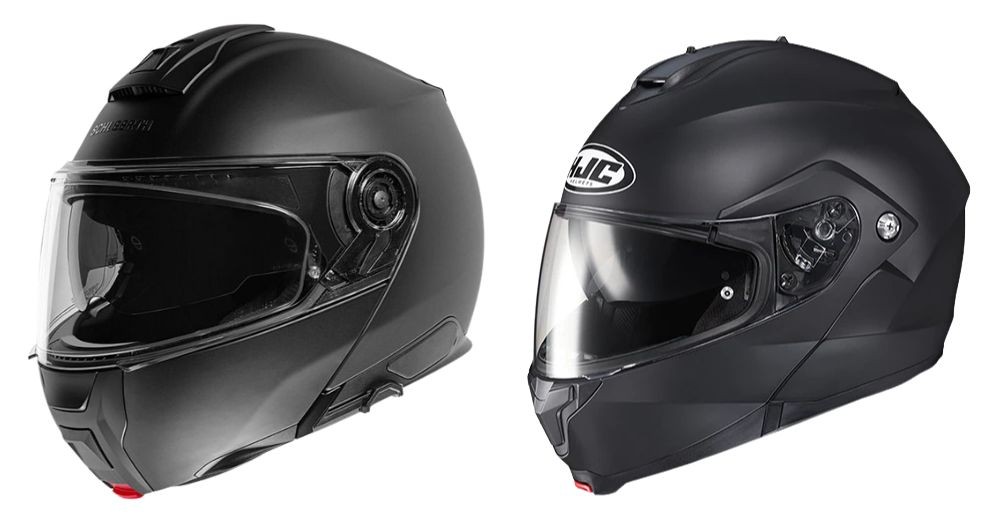
- Safety margin: The C5 meets ECE 22.06 (plus DOT) and is dual‑homologated, offering higher impact and rotational test standards than the C91’s ECE 22.05/DOT rating. That alone may justify the cost for risk‑averse riders.
- Noise reduction: Reduced wind noise and buffeting on long rides means less fatigue and potentially less hearing damage. If you ride hundreds of miles regularly, the difference is substantial.
- Comfort & ventilation: The C5’s vent filters, Pinlock 120 insert and plush interior make riding in varying climates more pleasant. The C91 ventilates reasonably but requires upgrades (Pinlock, chin curtain) to match.
- Integration: Built‑in SC2 comms support and five‑year warranty show that Schuberth expects the helmet to last through multiple seasons. Smart HJC units add cost and complexity to the C91.
For riders who tour frequently or prioritise safety and quietness, the C5’s price premium is justifiable. Casual commuters or budget‑minded riders can save significant money with the C91 and still get modular convenience, but they should expect more noise, less refined fit, and potentially shorter service life.
If you’re focused purely on long-distance comfort and quiet, see our full roundup of best touring helmets for long rides, where the C5 takes the premium touring slot.
Other Helmets Worth a Look
HJC i91 – The successor to the C91 improves on sizing and comfort with three shell sizes and a lighter polycarbonate shell. It meets ECE 22.06 and remains affordable, though still louder than premium modulars. Ideal for riders who like HJC’s fit but want upgraded safety.
If you like the C91’s value but want a more modern version with refinements, see our HJC i91 review.
A solid, comfortable, and affordable touring helmet with its fair share of flaws. But for the price and strong necks, it's good value. Read our full review here.
- Super comfortable liner and plush padding
- 3 shell sizes for better fit, look, and weight
- One of the best drop down sun visors in any helmet
- Heavy on the neck
- Flimsy visor that doesn't seal well
Shoei Neotec 3 – A premium competitor to the C5 with a composite shell, excellent ventilation, and very good noise control. It’s slightly heavier and similarly priced but offers a plush fit and an easy‑to‑operate chin bar.
A premium modular helmet built for long-distance comfort and low noise, with a smooth flip-up chin bar, tightly-sealing visor and wide drop down sun shade. Fits the SRL3 Sena comms system seamlessly.
- Comfortable wear all day
- Quiet, aerodynamic performance
- Flip-front convenience at stops
- Integrated comms & sun visor
- Faceshield lock is sometimes stiff
- Heavier weight may fatigue neck on long rides
HJC RPHA 91 – HJC’s top‑tier modular uses a composite PIM Evo shell for better impact protection and weighs about 3.75 lb. Noise levels are much lower than the C91, and it’s Smart HJC ready. Price sits midway between the C91 and C5, making it a strong value.
A premium DOT-rated modular helmet combining composite‑shell strength with a smooth flip‑front, quiet ride and adjustable sun visor for long-distance touring comfort.
- Composite PIM Evo shell offers superior impact protection
- Adjustable drop-down sun visor adapts to changing light
- Very quiet for a modular helmet—~96 dB at highway speeds
- Comfortable, plush liner with interchangeable cheek pads
- Slightly heavy compared to lighter modulars
- Chin bar lock can be finicky to operate with gloves
For a wider look at flip-up designs across price points, check our best modular helmets. It highlights the C5 at the top end and more budget-friendly HJC models.
Frequently Asked Questions
Is the Schuberth C5 really that much quieter than the HJC C91?
Yes. The C5’s fiberglass/carbon shell, wind‑tunnel shape and thick neck roll make it one of the quietest modular helmets. The C91’s polycarbonate shell transmits more vibration, so wind noise is average to loud at highway speeds. Earplugs are advisable for both, but the C5 requires them less often.
Does the C5’s dual P/J certification matter?
Dual homologation means the helmet has been tested and approved to be ridden both closed (full‑face) and open (jet) at road speeds. The C91 lacks this certification, so riding with the chin bar up could be illegal in some regions. If you often ride open during slow sections, this certification adds peace of mind.
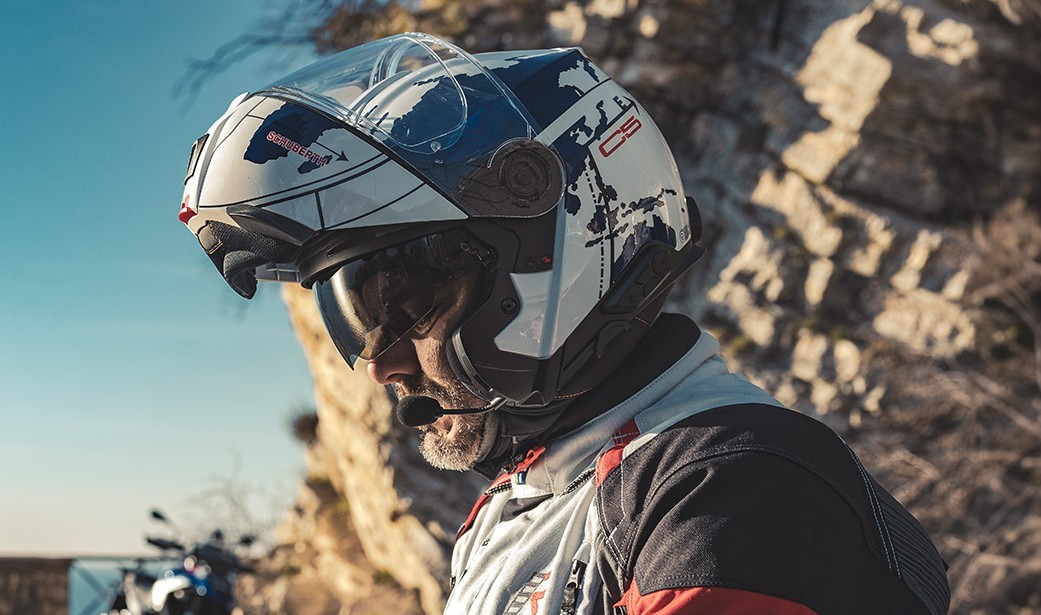
How does sizing differ between the two?
The C5 runs true to size with two shell sizes and a well‑padded interior. The C91 runs small and suits round‑oval heads; many riders need to size up and may need thinner cheek pads to relieve pressure.
Can both helmets accept communication systems?
Yes, but integration differs. The C5 has built‑in speakers and antennas for the SC2 system (a Sena 50‑Series derivative). The C91 is Smart HJC ready and accepts 10B/20B Bluetooth units sold separately.
Which helmet is better for hot weather?
Both ventilate well for modulars. The C5’s dual vent system with washable filters and included Pinlock makes it more adaptable across seasons. The C91’s ventilation is good but can feel warm in extreme heat; adding a chin curtain may reduce airflow but will help with noise.
Is the weight difference noticeable?
The C5 is slightly lighter (about 50–60 g) and better balanced due to its composite shell. Most riders notice the difference only on very long rides. If weight is your top priority, consider non‑modular full‑face helmets which are significantly lighter.
The quietest touring helmet money can buy, kitted out with all the features you expect for those long days in the saddle. | An affordable, lightweight modular helmet that delivers comfort, solid fit, and handy features like drop‑down sun visor and SmartHJC Bluetooth integration. |
|
|
|
|
The quietest touring helmet money can buy, kitted out with all the features you expect for those long days in the saddle.
- Modular flip up chin bar
- Drop down sun visor
- Space for integrated comms unit
- Many colorway options
- DOT certified, with ECE in EU
- Sun‑shield slider doesn’t deploy far enough for all riders
- Visor may drop unintentionally at high speeds on some bikes
An affordable, lightweight modular helmet that delivers comfort, solid fit, and handy features like drop‑down sun visor and SmartHJC Bluetooth integration.
- Lightweight and comfortable modular convenience
- Great airflow and ventilation even on long rides
- Secure, easy-to-use flip-up chin bar mechanism
- SmartHJC-ready – seamless Bluetooth add-on capability
- Runs small; most riders need to order one size up
- Wind noise at highway speeds may require earplugs
Not sure your comms unit will fit?
Sometimes the perfect helmet comes with a catch—it’s designed around a specific Bluetooth unit. That can make it tough if you prefer something different. With an adapter from Tubs Jackson, you can get a factory fit for any comms units on helmets you actually want to ride in.
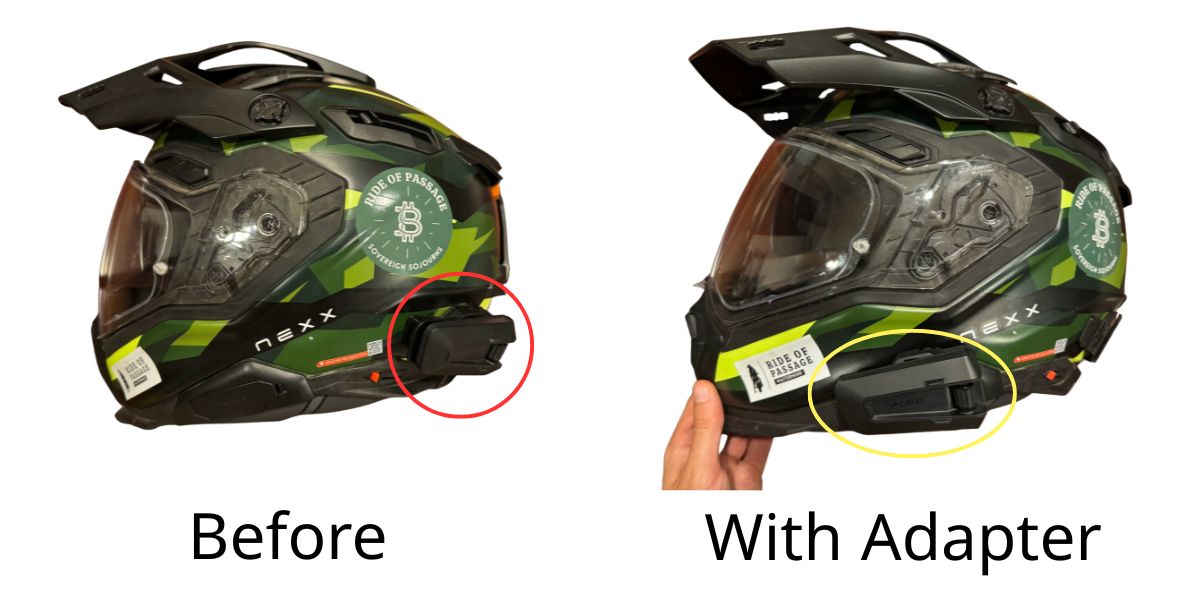
Tubs Jackson is a weird name, I know, but I have their adapter in my Nexx X.WED3 helmet and it’s rock solid. Much nicer than reaching way back to where I had the sticky mount before. I wish I’d thought of this idea.
Tip: Get FREE SHIPPING just by buying here or using code BETTERONTHEROAD at checkout.
Related

Carbon Fiber Modular Helmets: Ultimate Flip-Up Lids
Discover carbon fiber modular helmets that deliver flip-up convenience, lightweight strength, and serious protection for every ride.

